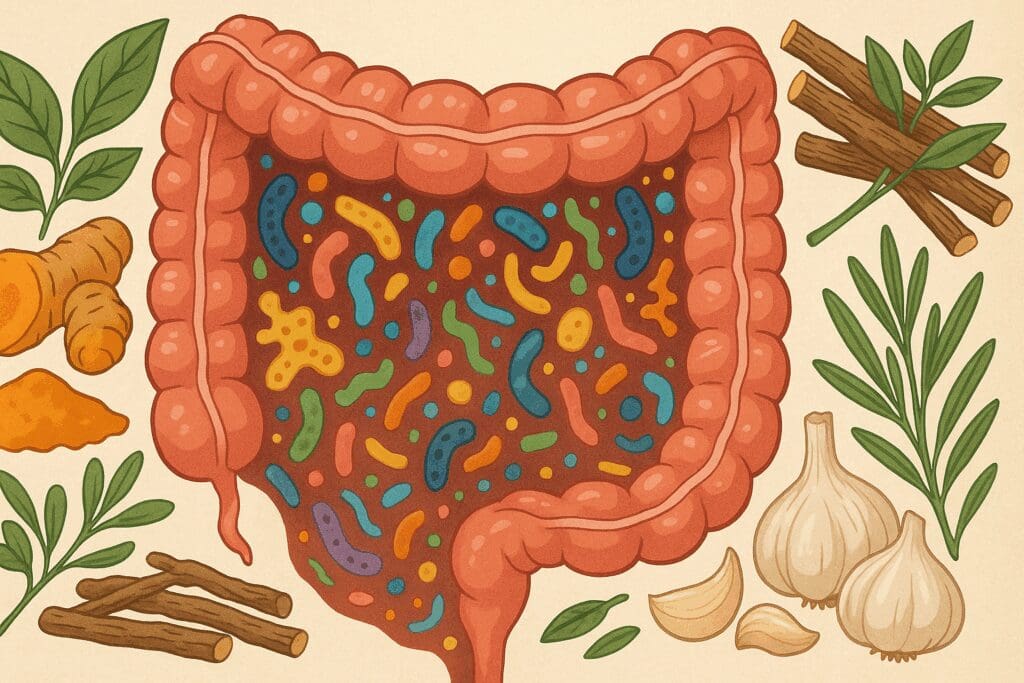Unlocking the Power of Natural Herbs for Weight Loss
In a world increasingly driven by convenience and synthetic solutions, many individuals are turning back to nature in their pursuit of sustainable health. Among the most researched and respected approaches to wellness is the integration of natural herbs for weight loss into one’s daily routine. Unlike harsh pharmaceutical alternatives, these botanicals offer a gentle yet effective means of supporting metabolic health, appetite control, fat oxidation, and overall well-being. They present a compelling blend of ancient wisdom and modern science, backed by decades of clinical exploration and cultural tradition. Today, as people seek safer and more holistic options for weight management, natural herbs for weight loss are emerging as a preferred and trusted ally.
What distinguishes natural weight loss foods and herbs from mainstream methods is their multifaceted approach to supporting the body. Rather than relying on quick fixes, these plants often work synergistically with bodily systems to enhance function, optimize nutrient utilization, and gently nudge metabolism in the right direction. In doing so, they not only promote fat loss but contribute to broader health goals, such as hormonal balance, digestive efficiency, and emotional resilience. As this article unfolds, we will explore ten scientifically validated benefits of incorporating herbs that help with weight loss into your lifestyle, shedding light on the profound role nature can play in our pursuit of physical and emotional vitality.
You may also like: The Ultimate High Fiber Diet Meal Plan for Sustainable Energy and Gut Health
Enhancing Metabolism Naturally with Thermogenic Herbs
One of the most celebrated benefits of natural herbs for weight loss is their ability to enhance the body’s basal metabolic rate (BMR) through thermogenesis. Thermogenic herbs like cayenne pepper, ginger, and green tea contain compounds that stimulate heat production, which, in turn, can increase calorie expenditure. Capsaicin, the active compound in cayenne, has been shown in multiple studies to raise core temperature slightly, promoting energy use even during rest. Similarly, the catechins in green tea, particularly epigallocatechin gallate (EGCG), have been extensively researched for their fat-burning effects and synergy with caffeine in enhancing metabolism.
These thermogenic properties are not just laboratory curiosities—they have practical implications for real-world weight loss. For instance, a clinical study published in the American Journal of Clinical Nutrition found that green tea extract significantly boosted fat oxidation during moderate exercise. Another investigation demonstrated that subjects who consumed capsaicin-rich meals experienced increased energy expenditure and greater fat burning throughout the day. Integrating these herbs into daily meals or supplement routines can subtly elevate calorie burn over time, supporting sustainable fat reduction without the jittery side effects often associated with stimulants.
What makes thermogenic herbs especially appealing is their versatility. They can be added to teas, smoothies, salads, or cooked dishes, offering a practical and palatable means of enhancing metabolic activity. Their warming properties also support digestion and circulation, offering ancillary benefits that contribute to overall health and satiety. For individuals seeking a gentle yet consistent metabolic boost, thermogenic herbs represent a time-tested and scientifically backed option.
Suppressing Appetite Through Herbal Support
Appetite control is a cornerstone of successful weight management, and herbs that help with weight loss often shine in this regard. Several natural botanicals have been shown to influence satiety signals, blood sugar balance, and emotional eating patterns. One notable example is fenugreek, a traditional herb rich in soluble fiber that expands in the stomach and helps curb hunger. Clinical studies indicate that fenugreek supplementation can reduce daily caloric intake and enhance feelings of fullness, particularly when taken before meals.
Another prominent herb in this category is Garcinia cambogia, which contains hydroxycitric acid (HCA). Research has explored its effects on serotonin levels, suggesting that it may reduce emotional eating by modulating mood and reward pathways in the brain. Although findings have been mixed, some well-designed trials report a modest reduction in appetite and weight among users who maintain consistent dosages alongside lifestyle adjustments. Similarly, gymnema sylvestre, long used in Ayurvedic medicine, appears to reduce sugar cravings by blocking sugar receptors on the tongue, helping individuals retrain their taste preferences and avoid excessive sweet consumption.
These herbs function not through brute force or appetite suppression in the pharmaceutical sense, but by harmonizing hunger signals and improving the body’s response to satiety cues. When integrated thoughtfully into a balanced dietary approach, they can help individuals regain control over their eating habits without experiencing the emotional or physiological backlash that often accompanies deprivation-based strategies. This subtle regulation of hunger not only supports weight loss but helps build a more mindful, intuitive relationship with food.

Balancing Blood Sugar Levels for Stable Energy and Cravings
Stable blood sugar is essential not just for energy and mood, but also for regulating hunger and minimizing fat storage. Spikes and crashes in glucose can lead to overeating, increased fat deposition, and difficulty adhering to dietary plans. Fortunately, several natural herbs for weight loss are also powerful allies in glycemic control. Cinnamon, for instance, has been extensively studied for its ability to enhance insulin sensitivity and reduce post-meal glucose spikes. Its polyphenols mimic insulin activity and slow carbohydrate absorption, helping to smooth out blood sugar fluctuations.
Berberine, a bioactive compound found in herbs like goldenseal and barberry, has gained popularity in recent years for its blood sugar-lowering effects. In clinical trials, berberine has demonstrated comparable efficacy to metformin, a pharmaceutical standard for type 2 diabetes, in reducing fasting glucose and improving HbA1c levels. Its mechanisms include enhancing glucose uptake in cells and modulating gut microbiota, which are both relevant to weight management. Similarly, bitter melon, another traditional remedy, contains insulin-like compounds that help cells absorb glucose more efficiently and reduce circulating sugar.
By incorporating these herbs into a weight loss plan, individuals can help stabilize their energy throughout the day and avoid the rollercoaster of cravings and crashes. This contributes to a more consistent caloric intake and can reduce the compulsion to snack or overeat, particularly in the late afternoon or evening. Over time, improved glycemic control also supports hormonal health and reduces inflammation, making it easier for the body to shed excess weight and maintain equilibrium.
Supporting Digestive Health and Nutrient Absorption
Optimal digestion is a foundational aspect of weight loss, as it determines how efficiently the body breaks down food, absorbs nutrients, and eliminates waste. Many natural weight loss foods and herbs contribute to digestive well-being by stimulating enzyme production, reducing bloating, and promoting regular elimination. Peppermint, for example, has long been used to soothe the gastrointestinal tract and reduce symptoms of irritable bowel syndrome. It can also relieve indigestion and improve bile flow, which is crucial for fat metabolism.
Fennel is another herb traditionally used to ease bloating and support peristalsis, the wave-like movements that propel food through the digestive system. Its carminative properties help relieve gas and reduce abdominal discomfort, which can often be misinterpreted as hunger. Licorice root, particularly in its deglycyrrhizinated form (DGL), helps soothe the stomach lining and reduce inflammation, creating a more favorable environment for nutrient uptake. These effects, while subtle, cumulatively enhance the body’s ability to process food efficiently and derive maximum benefit from healthy meals.
Healthy digestion also plays a key role in regulating the gut-brain axis, a communication pathway that links intestinal function with mood and appetite control. Herbs that promote digestive integrity often support mental clarity and emotional stability, both of which are essential for adhering to weight loss plans. When the digestive system is functioning smoothly, energy levels rise, cravings diminish, and motivation is easier to sustain. As such, digestive support through herbal means forms a critical, often overlooked component of holistic weight management.
Promoting Fat Oxidation and Lipid Breakdown
Fat oxidation, the process by which stored fat is broken down and used for energy, is a critical aspect of effective weight loss. Several herbs that help with weight loss work directly on this metabolic pathway, encouraging the body to utilize fat stores more efficiently. One of the best-known examples is green coffee bean extract, which contains chlorogenic acid—a compound that has been shown to reduce the absorption of carbohydrates and promote fat utilization. Studies have demonstrated its potential to decrease body fat percentage when combined with modest lifestyle changes.
Another standout herb is forskolin, derived from the Coleus forskohlii plant. Forskolin activates adenylate cyclase, an enzyme that increases levels of cyclic AMP in cells and stimulates the breakdown of fat tissue. Human studies have yielded promising results, with participants experiencing reductions in body fat and waist circumference over several weeks of supplementation. Additionally, conjugated linoleic acid (CLA), although technically a fatty acid rather than an herb, is often used in herbal supplement formulations for its capacity to enhance fat oxidation and preserve lean mass.
The value of these herbs lies not only in their direct biochemical actions but also in their compatibility with natural weight loss strategies. They tend to produce gradual, sustainable effects rather than abrupt changes that can be difficult to maintain. When combined with physical activity, their impact on fat metabolism becomes even more pronounced, making them a strategic addition to long-term health plans. By promoting fat oxidation in a gentle, physiologically harmonious way, these herbs help individuals move closer to their ideal body composition without resorting to extreme measures.
Boosting Mood and Reducing Stress to Prevent Emotional Eating
Weight management is not solely a physical endeavor—it is also deeply rooted in emotional and psychological well-being. Stress-induced eating, often triggered by cortisol imbalances and emotional distress, can significantly derail even the most well-structured dietary plans. Fortunately, several natural herbs for weight loss offer mood-stabilizing and adaptogenic benefits, helping individuals manage stress more effectively and reduce the likelihood of emotional eating.
Ashwagandha is one such herb that has garnered considerable scientific interest. As an adaptogen, it helps regulate the hypothalamic-pituitary-adrenal (HPA) axis and reduce cortisol levels. Studies have shown that individuals taking ashwagandha experience improvements in stress resilience, sleep quality, and even reductions in body weight—effects believed to stem from improved hormonal balance and reduced stress-related eating behaviors. Rhodiola rosea is another adaptogenic herb that enhances mental performance, mitigates fatigue, and supports mood stability during challenging times. These effects are particularly valuable for those navigating the psychological hurdles of long-term weight loss.
In addition to adaptogens, herbs like lemon balm and holy basil offer calming properties that support parasympathetic nervous system activity, encouraging relaxation and emotional balance. By modulating neurotransmitter activity and improving sleep quality, these herbs can indirectly support weight loss efforts. When stress is reduced and emotional well-being is stabilized, individuals are less prone to reach for comfort foods and more likely to make intentional, healthful choices. Incorporating such herbs into a wellness routine helps create a psychological environment conducive to consistency, discipline, and self-care—qualities that are often just as important as diet and exercise in achieving sustainable weight management.

Natural Herbs for Weight Loss That Promote Detoxification and Liver Support
The liver plays a central role in fat metabolism, hormone regulation, and detoxification—all of which are critical components of effective weight management. When the liver is burdened by excessive toxins or poor dietary choices, its ability to process fats and regulate hormones becomes impaired. This can lead to fat accumulation, especially around the abdomen, and make weight loss far more difficult. Fortunately, several natural herbs for weight loss have a long history of use in supporting liver health and promoting gentle detoxification.
Milk thistle is one of the most widely studied hepatoprotective herbs. Rich in the antioxidant silymarin, milk thistle supports the regeneration of liver cells and protects them from damage caused by oxidative stress or toxins. Research has shown that it can improve markers of liver function, particularly in individuals with non-alcoholic fatty liver disease—a condition closely tied to obesity and insulin resistance. By improving liver function, milk thistle can indirectly enhance fat metabolism and reduce systemic inflammation, both of which are beneficial for weight loss.
Dandelion root is another herb traditionally used for liver support. It acts as a mild diuretic and stimulates bile production, aiding in the digestion and emulsification of fats. Burdock root, meanwhile, is known for its blood-purifying properties and contains inulin, a prebiotic fiber that supports healthy gut flora. The combined actions of these herbs promote the efficient elimination of waste and toxins, which is essential for reducing inflammation and optimizing metabolic function.
These herbs do not act as extreme detoxifiers in the way that harsh cleansing protocols might suggest. Instead, they support the liver\u2019s natural detoxification pathways, helping the body maintain balance while pursuing healthy weight goals. Including these herbs as teas, tinctures, or supplements ensures that internal systems remain resilient and functioning optimally during the weight loss journey.
The Role of Natural Herbs for Weight Loss in Hormonal Balance
Hormones are the unsung heroes—or villains—of weight loss, depending on how well they are regulated. From insulin and cortisol to leptin and estrogen, hormonal fluctuations can significantly influence appetite, fat storage, energy levels, and mood. Natural herbs for weight loss often exert subtle yet meaningful effects on hormonal systems, helping restore equilibrium and facilitating more consistent progress toward fitness goals.
Maca root is a notable example of an herb with hormone-balancing properties. Native to the Andes, maca is known to support endocrine function and has been used traditionally to enhance fertility and energy. Modern research suggests that maca can modulate estrogen levels, improve thyroid function, and support adrenal resilience, making it a valuable ally for women experiencing hormonal weight fluctuations, especially during perimenopause or menopause.
Chasteberry, or Vitex agnus-castus, is another herb revered for its regulatory effects on the female reproductive system. It influences the pituitary gland, encouraging progesterone production and stabilizing the menstrual cycle. For women with polycystic ovarian syndrome (PCOS), which is often linked to weight gain and insulin resistance, chasteberry may help alleviate some of the underlying hormonal imbalances contributing to weight retention.
For men and women alike, herbs like ginseng and licorice (in appropriate, short-term doses) can support adrenal health and mitigate the effects of chronic stress on the body\u2019s hormonal balance. When hormones are in harmony, the body is more likely to respond positively to nutritional changes and physical activity. Thus, targeting hormonal balance through carefully selected herbs enhances not only metabolic outcomes but overall vitality and well-being.
Long-Term Weight Management and Satiety Enhancement
Sustainable weight management hinges on the ability to feel satisfied with less food, maintain consistent energy levels, and avoid rebound weight gain after reaching target goals. One of the lesser-known but powerful advantages of natural weight loss foods and herbs is their ability to enhance satiety and promote feelings of fullness, especially when paired with high-fiber diets and protein-rich meals.
Psyllium husk is a popular fiber supplement derived from the seeds of Plantago ovata, but it is also considered an herbal aid due to its natural origin. When taken with water before meals, psyllium expands in the stomach and forms a gel-like substance that slows digestion and enhances feelings of fullness. Several clinical studies have demonstrated its effectiveness in reducing appetite, caloric intake, and even LDL cholesterol levels.
Glucomannan, derived from the root of the konjac plant, is another soluble fiber with robust scientific backing. It has an impressive capacity to absorb water and expand in the stomach, making it one of the most effective natural appetite suppressants available. Studies show that glucomannan, when consumed before meals, can lead to statistically significant weight loss over periods of 8 to 12 weeks, especially when combined with a calorie-controlled diet.
By reducing the physical sensation of hunger and slowing gastric emptying, these herbal fibers allow for more mindful eating patterns and reduced meal frequency without discomfort. Over time, this not only assists in caloric reduction but helps individuals recalibrate their hunger cues and rebuild a healthier relationship with food. This long-term behavioral adaptation is one of the most critical elements of sustainable weight loss, and herbs that support satiety offer a practical way to reinforce it.

Improving Gut Microbiome Composition for Metabolic Health
A growing body of evidence suggests that gut microbiota plays a pivotal role in metabolism, weight regulation, immune health, and even mental well-being. The balance between beneficial and harmful gut bacteria can significantly influence how efficiently the body digests food, absorbs nutrients, and stores fat. Natural herbs for weight loss often contain prebiotic fibers or antimicrobial compounds that help shape the gut environment in favorable ways.
Slippery elm, marshmallow root, and licorice root support the gut lining and reduce intestinal inflammation, which can help restore barrier integrity and prevent the leaky gut syndrome—a condition linked to systemic inflammation and metabolic dysfunction. Herbs like oregano, garlic, and thyme exhibit selective antimicrobial activity, suppressing pathogenic bacteria without disrupting beneficial strains. When gut pathogens are brought under control, beneficial species like Lactobacillus and Bifidobacteria can flourish, contributing to better digestion and energy regulation.
Turmeric, while most renowned for its anti-inflammatory properties, also exerts prebiotic-like effects by increasing the abundance of short-chain fatty acid-producing bacteria. These short-chain fatty acids, especially butyrate, are essential for gut health and play a role in regulating metabolism and appetite. By influencing microbial composition and activity, these herbs help optimize digestive efficiency, reduce inflammation, and create a more favorable environment for fat loss.
Supporting the microbiome is not only about digestion but also about hormonal signaling, immune regulation, and neurochemical balance. When natural weight loss foods and herbs contribute to microbial diversity and stability, the results extend far beyond the gut. The entire metabolic network becomes more resilient, allowing for more efficient energy use, reduced fat accumulation, and improved mood—all of which feed back into healthier lifestyle choices and greater long-term success.

Preserving Lean Muscle Mass During Weight Loss
While many weight loss strategies focus solely on reducing body fat, maintaining lean muscle mass is equally important. Muscle tissue is metabolically active, meaning it burns more calories at rest than fat. Preserving and building lean mass ensures that the body’s metabolism remains robust even as weight decreases. Certain herbs that help with weight loss support this goal by reducing inflammation, improving nutrient assimilation, and even stimulating anabolic pathways.
Turmeric and its active constituent curcumin help reduce systemic inflammation and oxidative stress, which can otherwise impair recovery and muscle repair after workouts. Chronic inflammation is a known driver of catabolism, or muscle breakdown, particularly in aging populations or individuals under metabolic stress. By curbing inflammatory cytokines and supporting mitochondrial health, turmeric indirectly aids in preserving muscle integrity.
Ginseng, particularly Panax ginseng, has demonstrated potential in enhancing physical performance and reducing fatigue. Its adaptogenic properties help modulate stress hormones that might otherwise contribute to muscle catabolism, and some studies suggest it may support protein synthesis pathways. Additionally, herbs like schisandra and cordyceps, traditionally used in Eastern medicine, are believed to improve endurance and energy metabolism, allowing for more effective workouts and better muscle retention.
When herbs are used to support muscle preservation during weight loss, the resulting changes in body composition are often more favorable. Fat loss accompanied by muscle gain or maintenance leads to a leaner, more defined physique and a more sustainable metabolic rate. For individuals pursuing long-term health and aesthetic goals, this balance is critical—and the right herbal allies can help make it possible.
The Evidence-Based Safety and Sustainability of Herbal Weight Management
A common concern among individuals considering herbal interventions is the issue of safety. Fortunately, the vast majority of herbs used for weight loss, when consumed in appropriate dosages and formats, are remarkably well-tolerated and carry fewer side effects than conventional weight loss medications. This is particularly true when the herbs are sourced from reputable suppliers, used under professional guidance, and integrated as part of a broader lifestyle strategy rather than relied upon in isolation.
Clinical studies often emphasize the importance of dosage, form (extract vs. whole herb), and timing when evaluating the efficacy and safety of herbal compounds. For example, while green tea is widely regarded as safe, high-dose catechin extracts should be taken with food and not on an empty stomach to prevent potential liver strain. Similarly, while berberine is effective for glycemic control, long-term use requires monitoring due to potential interactions with gut microbiota and nutrient absorption.
What makes natural herbs for weight loss particularly appealing is their adaptability. They can be consumed as teas, tinctures, capsules, or culinary ingredients, making them easy to incorporate into daily routines. This flexibility supports adherence and allows for individualized approaches that accommodate personal preferences, health conditions, and cultural traditions. The best outcomes are observed when these herbs are used not as shortcuts, but as strategic tools that enhance and reinforce positive habits.
Frequently Asked Questions (FAQ) on Using Natural Herbs for Weight Loss
What is the best time of day to take natural herbs for weight loss?
The effectiveness of natural herbs for weight loss can be significantly influenced by timing. Thermogenic herbs like cayenne, green tea extract, or ginger are generally best consumed in the morning or before physical activity, as they can help stimulate metabolism and energy levels throughout the day. Conversely, calming adaptogens such as ashwagandha or lemon balm are better suited for evening use, as they may promote relaxation and aid in stress reduction, which can curb late-night snacking. Fiber-based herbs like psyllium husk or glucomannan should be taken before meals with plenty of water to support satiety and digestive function. For optimal results, align herbal intake with your body’s natural rhythms and consult a healthcare provider for personalized guidance.
Can natural herbs for weight loss interact with prescription medications?
Yes, several herbs that help with weight loss may interact with common prescription drugs, particularly those affecting blood pressure, blood sugar, or mood. For example, berberine can amplify the effects of antidiabetic medications, potentially leading to hypoglycemia if not monitored. Similarly, licorice root may raise blood pressure when taken in large amounts and could counteract antihypertensive drugs. St. John’s Wort, although often used for mood regulation, can alter liver enzyme activity and reduce the effectiveness of medications like antidepressants or birth control pills. Anyone using herbal supplements alongside pharmaceuticals should consult a healthcare practitioner to ensure safety and avoid unintended side effects or reduced drug efficacy.
How can natural weight loss foods and herbs support long-term habit change?
Beyond their physiological benefits, natural weight loss foods and herbs can reinforce healthier routines through sensory and behavioral conditioning. For example, incorporating herbs like cinnamon or fennel into daily meals creates a ritual around mindful eating, which over time helps reduce mindless snacking or emotional bingeing. Many herbs also support neurochemical balance, indirectly improving mood and reducing stress-related cravings. This subtle psychological reinforcement, combined with physiological support, fosters more intentional eating habits. Additionally, the act of preparing herbal teas or tinctures may encourage self-care behaviors that make it easier to commit to broader wellness goals long-term.
Are there any emerging trends in how natural herbs for weight loss are used today?
Yes, emerging trends in herbal weight management include the use of personalized botanical blends tailored to genetic, hormonal, or microbiome profiles. Companies are beginning to offer DNA-based recommendations that match individuals with specific herbs aligned to their metabolic tendencies or food sensitivities. Additionally, nano-formulated herbal supplements are being developed to enhance bioavailability, allowing smaller doses to deliver greater therapeutic effects. Functional beverages infused with herbs that help with weight loss—such as turmeric lattes or matcha-based elixirs—are also becoming popular among wellness consumers seeking convenience and flavor. These innovations reflect a growing fusion of traditional herbalism with modern nutritional science.
How do herbs that help with weight loss influence emotional eating patterns?
Certain herbs modulate neurotransmitters like serotonin and dopamine, which are closely tied to emotional regulation and reward-seeking behavior. For example, saffron has shown promise in reducing symptoms of depression and lowering snack frequency by modulating serotonin pathways. Similarly, holy basil (tulsi) reduces cortisol, which is often elevated in individuals who experience stress-induced eating. By targeting the neuroendocrine system, these herbs support more stable moods and reduce the compulsion to eat for emotional comfort. Over time, this can help individuals replace reactive food behaviors with more conscious, emotionally grounded decision-making around meals.
What are some overlooked lifestyle habits that can enhance the benefits of natural herbs for weight loss?
While herbs provide powerful support, their effectiveness increases when paired with complementary lifestyle practices. Prioritizing quality sleep, for instance, supports hormonal balance and enhances the metabolism-boosting effects of herbs like ginseng or maca. Staying well-hydrated improves the solubility and absorption of herbal compounds, especially fiber-rich herbs like glucomannan. Regular movement—not just structured workouts but daily walking or stretching—synergizes with circulation-enhancing herbs such as cayenne or ginger. Finally, cultivating mindfulness around eating and daily stress can deepen the benefits of herbs aimed at appetite regulation or emotional support, such as lemon balm or fenugreek.
How do natural weight loss foods and herbs affect women differently than men?
Hormonal fluctuations in women—especially around menstruation, perimenopause, and menopause—can affect how the body responds to both food and herbs. For instance, estrogen-related weight gain may be counteracted by phytoestrogen-containing herbs like red clover or maca, which help modulate hormonal balance. Women may also benefit from chasteberry to regulate prolactin and progesterone levels, which influence weight through water retention and mood. Conversely, herbs that significantly increase thermogenesis or cortisol—like high doses of caffeine or even ginseng—may require careful monitoring to avoid disrupting delicate hormonal balance. Tailoring herbal protocols to a woman’s hormonal phase can improve safety and efficacy.
How should I cycle or rotate herbs that help with weight loss to avoid tolerance?
Just as the body can adapt to pharmaceuticals or stimulants, it may also adjust to certain herbs if used continuously. To prevent tolerance, many herbalists recommend rotating stimulating herbs such as green tea extract or yerba mate every 4 to 6 weeks. This allows the body to maintain sensitivity while reducing dependency or diminished effects. Adaptogens like ashwagandha or rhodiola can typically be used longer but may still benefit from occasional breaks to reassess efficacy. Introducing seasonal variety with herbs aligned to climate, mood, and energy levels can also promote overall balance and avoid over-reliance on any one compound.
What are the top mistakes to avoid when using natural herbs for weight loss?
A common mistake is treating herbal supplements as a standalone solution without addressing diet, lifestyle, or psychological factors. Another error is overdosing or combining too many stimulating herbs, which can lead to insomnia, anxiety, or gastrointestinal discomfort. Choosing low-quality or adulterated supplements is also risky, as contaminants or mislabeled ingredients may undermine efficacy and safety. Skipping professional guidance is another misstep—many herbs that help with weight loss require precise dosing and may not be suitable for everyone. Lastly, neglecting to track progress or observe how the body responds can result in missed opportunities to optimize outcomes or avoid side effects.
What does the future hold for natural herbs for weight loss in mainstream healthcare?
As consumer demand for plant-based, holistic solutions grows, natural herbs for weight loss are likely to gain broader acceptance in clinical and integrative healthcare settings. Researchers are increasingly exploring how herbs interact with pharmaceuticals, microbiota, and metabolic pathways, providing a stronger scientific foundation for their use. Hospitals and wellness clinics may begin offering herbal consultations as part of weight management programs, and insurance providers could eventually reimburse for evidence-based botanical therapies. Furthermore, AI-driven health platforms may use real-time data to recommend specific herbal regimens based on an individual’s biometrics, hormones, and lifestyle. This evolution suggests that natural weight loss foods and herbs will not only remain relevant—but may become a cornerstone of personalized medicine in the near future.
Final Thoughts: Embracing the Proven Power of Natural Herbs for Weight Loss
The journey toward sustainable weight loss is a complex interplay of biology, behavior, and lifestyle. While there is no singular solution, the incorporation of natural herbs for weight loss offers a compelling, scientifically backed strategy that aligns with the body’s inherent wisdom. These herbs provide support across multiple dimensions of health—enhancing metabolism, balancing hormones, promoting digestion, improving mood, and stabilizing blood sugar—all of which are crucial for long-term success.
What sets natural weight loss foods and herbs apart is their ability to nourish rather than deprive, to harmonize rather than disrupt. They respect the body’s natural rhythms, offering gentle guidance rather than brute force. For the college-educated reader seeking depth, nuance, and evidence-based strategies, these herbal solutions present an opportunity to integrate centuries-old wisdom with cutting-edge science.
As always, individuals considering new herbal regimens should consult with qualified healthcare practitioners to ensure safety, especially if they have pre-existing conditions or are taking medications. But with informed choices and mindful implementation, natural herbs for weight loss can become a vital part of a broader, holistic approach to health—one that honors both tradition and innovation in equal measure.
Further Reading:
Using Herbal Remedies to Maintain Optimal Weight



